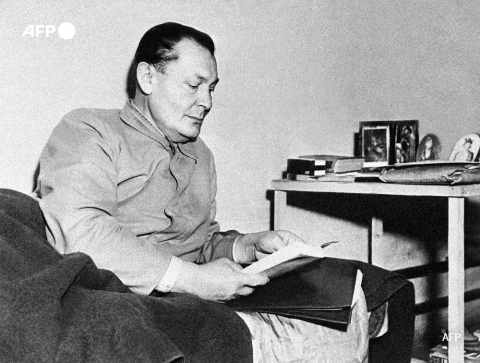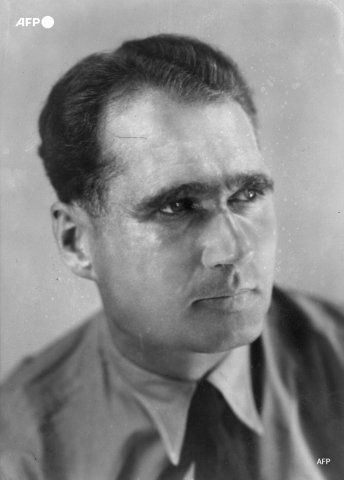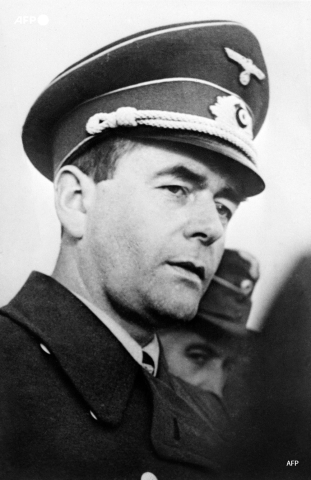Goering, Hess, Speer & co. in Nuremberg dock

By Bénédicte REY
Hermann Goering, Rudolf Hess and Albert Speer topped the list of 21 defendants at the Nuremberg trials.
Three of the accused were not present however, two of whom were dead.
There were eight groups charged as well, including the Gestapo and SS killing machines.
Adolf Hitler, Joseph Goebbels and Heinrich Himmler died as the war ended, and never stood trial for war crimes or crimes against humanity, two of the main accusations before the tribunal.
Here is a snapshot of some of the Third Reich's most infamous figures, and others who quickly faded back into anonymity.
Hermann Goering: The highest-ranking Nazi official on trial. Goering was head of the German air force after leading the SA paramilitary militia and serving as president of the Reichstag parliament in 1932.
When Hitler came to power, Goering built the concentration camps and created the secret police force known as the Gestapo. When the war broke out he was second in line to the Fuehrer.
Losing the Battle of Britain broke his spirit, and when he surrendered to US forces in 1945 Goering was addicted to morphine.
Sentenced to death by hanging, he swallowed cyanide instead on October 15, 1946.

Rudolf Hess: Hess was an early Hitler ally, helping to write the book "Mein Kampf" (My Struggle) after they were jailed for a failed Munich putsch in November 1923.
At first Hitler's personal secretary, Hess appeared to be third in line after Goering in 1939 but was then sidelined during the war.
In 1941, Hess headed to Scotland for what is believed to be a secret attempt to negotiate peace, but the plan failed and he was jailed.
His mental stability in question, Hess was sentenced to life in prison, and found hung in his Spandau prison cell in 1987. He was 93 and the facility's sole inmate.
Albert Speer: Speer was the Third Reich's architect. He joined the Nazi party in 1931 and designed the massive complex in Nuremberg where Nazi rallies where staged, and Hitler's chancellary in Berlin.
In 1942, Speer became the head of weapons production and relied heavily on forced labour. In 1945 he distanced himself from Hitler and at Nuremberg he was the only defendant to accept responsibility for his actions.
Speer was sentenced to 20 years in prison, and released in 1966. He acknowledged his responsibility again in written memoires, and died of a heart attack in 1981 while on a visit to Britain.

The others on trial were:
- Joachim von Ribbentrop, German foreign minister.
- Wilhelm Keitel, German army chief of staff from 1938 to 1945.
- Julius Streicher, head of the publication "Der Stuermer", who called for the extermination of Jews.
- Ernst Kaltenbrunner, senior officer in the Nazi police force, head of the security services SD and RSHA.
- Alfred Rosenberg, Nazi theorist and minister of occupied territories.
- Hans Frank, Nazi party governor known as the "Butcher of Poland."
- Wilhelm Frick, lead author of the 1935 Nuremberg racial laws.
- Hjalmar Schact, head of the central bank from 1933 to 1939 and economy minister from 1934 to 1937.
- Arthur Seyss-Inquart, interior minister in 1938, he played a key role in the Austrian Anschluss, and was Reich commissioner for the Netherlands.
- Karl Doenitz, head of the German navy.
- Walther Funk, succeeded Schact as head of the central bank and economy ministry.
- Baldur von Schirach, head of the Hitler Youth organisation.
- Fritz Sauckel, Reich commissioner for labour responsible for the deportation of forced workers to Germany.
- Erich Raeder, head of the German navy until 1943.
- Alfred Jodl, senior army commander
- Franz von Papen, German chancellor before Hitler, then ambassador to Austria and Turkey.
- Constantin von Neurath, foreign minister from 1932 to 1938.
- Hans Fritzsche, head of the ministry of propaganda's radio service.
The three who were charged but not present at the trial were:
- Martin Bormann, sucessor to Hess as Hitler's aid and head of the NSDAP (Nazi Party). He died while trying to escape from Hitler's bunker on May 1, 1945.
- Gustav Krupp von Bohlen und Halbach, head of the industrial group Krupp who was deemed medically unfit to stand trial.
- Robert Ley, head of the German Labour Front, who committed suicide in his jail cell on October 25, 1945 before the trial began.
The eight indicted organisations were:
- The Reich government.
- The combined leaders of the NSDAP.
- The Gestapo secret police.
- The SS group that initially provided protection for Hitler before expanding into a multi-ethnic, multi-national force.
- The SD group that collected intelligence for the SS and NSDAP.
- The SA group, a paramilitary unit within the NSDAP.
- The combined German chief of staff
- The high command of the German armed forces.
